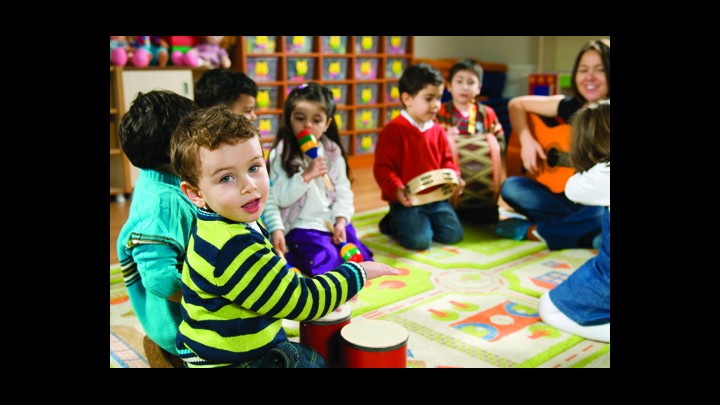Toddlers
Educational Benefits/Facts:
- Research reveals strong connections between rhythm skills and pre-reading abilities in toddlers (Woodruff Carr K, W.-S.T., Tierney A, Strait D, Kraus N. , Beat synchronization and speech encoding in preschoolers: A neural synchrony framework for language development. , in Association for Research in Otolaryngology Symposium. 2014: San Diego, CA.)
- Music education enhances fine motor skills (Arts Education Partnership, 2011).
Cognitive Benefits/Facts:
- Music enhances fine motor skills, or the ability to use small, acute muscle movements to write, use a computer, and perform other physical tasks (Forgeard, 2008; Hyde, 2009; Schlaug et al. 2005, "The Effects of Musical Training on Structural Brain Development A Longitudinal Study," The Neurosciences and Music III: Disorders and Plasticity: Ann. N.Y. Acad. Sci. 1169: 182–186).
- Research reveals strong connections between rhythm skills and pre-reading abilities in toddlers (Woodruff Carr K, W.-S.T., Tierney A, Strait D, Kraus N. , Beat synchronization and speech encoding in preschoolers: A neural synchrony framework for language development., in Association for Research in Otolaryngology Symposium. 2014: San Diego, CA.)
- Infants recognize the melody of a song long before they understand the words. They often try to mimic sounds and start moving to the music as soon as they are physically able (© 2015 Program for Early Parent Support (PEPS), a 501(C)(3) nonprofit organization).
- Toddlers love to dance and move to music. The key to toddler music is the repetition of songs which encourages the use of words and memorization. Silly songs make them laugh. Try singing a familiar song and inserting a silly word in the place of the correct word, like “Mary had a little spider” instead of lamb. Let them reproduce rhythms by clapping or tapping objects (© 2015 Program for Early Parent Support (PEPS), a 501(C)(3) nonprofit organization).
- Toddlers often get exposure to new songs through their favorite TV shows, such as The Wiggles. They can identify these tunes easily and relate them to these programs. Toddlers enjoy singing on their own and while they play. Even deaf children will sing independently without prompting.
- Deaf toddlers with cochlear implants also love music, despite the tones being suboptimal. They also sing along (though often off-key) and get a lot of pleasure from music. While they don't often recognize melodies, deaf toddlers do recognize rhythms.
- While there are skill differences between infants when it comes to musical perception and abilities, some children receive more exposure to music and may simply be more musical due to that fact. However, interest in the kind of music can definitely affect desire. Structured music may not appeal to some children if it's not customized to their interests or tastes. As a result they lose interest.
Infants
Cognitive Benefits/Facts:
- Infants are intensely interested in music. This interest enables babies to perceive nuances and changes in pitch and rhythm of songs in foreign languages that even their parents don't notice.
- Infants have precocious listening skills. In many ways infants perceive music just as adults do. They can recognize the same song in a different pitch and tell the difference in songs containing missing or dissonant notes. Like adults, babies remember and prefer pleasant rather than unpleasant music.
- Infants have an excellent memory for music. After 1-2 weeks of exposure, infants remember a song they have heard and can distinguish it from unfamiliar melodies. They prefer new music to the familiar though, because they are curious and are stimulated by something new.
- Infants who are sung to are more content, sleep better and have an overall better sense of well-being. Maternal singing is mesmerizing to infants and tends to catch their attention better than spoken language. Mothers are usually a child's first musical mentor and their singing enhances the bond between mother and infant. It also eases the burdens of care giving by producing a more content baby and a more relaxed mother.
- Parents also sing more to young children and have a special repertoire of songs they use to entertainment or comfort them, namely lullabies and play songs. These kinds of songs have similar features across very different world cultures. These melodies are more emotional, higher-pitched, have a slower tempo and are more intimate. Infants prefer maternal singing to maternal speech and find it more calming.
Social Benefits/Facts:
- Infants live in a highly musical environment. Infants are surrounded by music, even in the musical or sing-song way parents speak to infants. Studies show that infants prefer this style of speech and are more attentive when parents communicate in this way.
Conclusion: Music is innate, universal and part of the human experience from a very early age.

